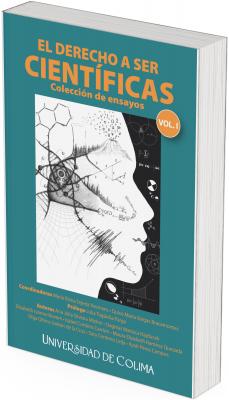The Right to Be Female Scientists: A Collection of Essays. Volume 1
Keywords:
Female scientists, Scientific dissemination, EssaySynopsis
What is needed to be a female scientist? What obstacles do women who want to pursue science face? How can we open paths so more girls and young women are able to achieve it? This book collects the voices of eight female scientists from Mexico, Brazil, Argentina, and Spain, who share, from their personal experiences and reflections, how their interest in science originated, the challenges they have faced and the achievements they have accomplished along their professional careers. Their stories reflect not only a deep commitment to knowledge, but also their perseverance upon facing structural obstacles that continue to limit the access to the scientific realm to women. Within these stories that are told by their protagonists, actively and in control, is the motor of change for being able to enjoy science. Through their stories, we come to understand that the right of becoming a scientist is not only a matter of equity and justice: it is the key to moving forward in our societies and in our collective well-being. It’s and invitation to imagine new futures, to be inspired by those who are already opening the path and join the construction of the diverse and inclusive scientific endeavor. The right to be female scientists. This collection of essays was thought of for you, who perhaps is discovering what you’re passionate about, who asks If you too could form part of that universe that is called science. The answer is not written in only one story, but rather in all these voices that, upon uniting, invite you to find yours, because the future is also built with women in science.
Downloads
References
Alonso R. et al. (2023). Importancia de las Geociencias en el ámbito social. Editorial Mundo Gráfico Salta. https://catalogomundoeditorial.com/#!/producto/294/
Anteneodo, C., Peres, D., Silva, S., Nattrodt, B. y Buss, K. (s.f). As cientistas no cinema. http://www1.fisica.org.br/gt-genero/images/Tabela_Filmes_Mulheres_Cientistas.pdf
Austrian Science Fund (FWF). (2024). Promoting a Safe and Inclusive Research Culture. https://tinyurl.com/5re6fky4
Bian, L., Leslie, S.J. y Cimpian, A. (2017). Gender stereotypes about intellectual ability emerge early and influence children's interests. Science, 355, 389. science.aah652. https://doi.org/10.1126/science.aah6524
Boston Consulting Group (2017). Dispelling the Myths of the Gender "Ambition Gap". https://www.bcg.com/ publications/2017/people-organization-leadership-change-dispelling-the-myths-of-the-gender-ambition-gap
Byron Macallum, A. y Mentenen, M.L. (1906). On the distribution of chlorides in nerve cells and fibres. Proceedings of the Royal Society of London. Series B. Biological Sciences, 77(516), 165-193. https://doi.org/10.1098/rspb.1906.0008
Chapman, E. (s.f.). Diversity work. https://dr-emma-chapman.com/diversity-work/ (acceso el 2 de marzo de 2023).
Cornish-Bowden, J. L. (2013). Maud Leonora Menten: a woman at the dawn of biochemistry. J. Biochem (London), 35(6), 46-47. https://doi.org/10.1042/BIO03506046
Deichmann, U., Schuster, S., Mazat, J.P. y Cornish-Bowden, A. (2014). Commemorating the 1913 Michaelis-Menten paper Die Kinetik der Invertinwirkung: Three perspectives. FEBS Journal, 281(2), 435-463. https://doi.org/10.1111/febs.12598
Diario Oficial de la Federación (DOF). (2020, 23 de junio). Acuerdo por el que se expide el Programa Institucional 2020- 2024 del Consejo Nacional de Ciencia y Tecnología.
Eaton, A.A., Saunders, J.F., Jacobson, R.K. y West, K. (2020). How gender and race stereotypes impact the advancement of scholars in STEM: professors' biased evaluations of physics and biology post-doctoral candidates. Sex Roles, 82, 127-141. https://doi.org/10.1007/s11199-019-01052-w
El efecto Tesla (2015, 7 de noviembre). Maria Skłodowska- Curie. http://elefectotesla.com/tag/petit-curie/
El País (s.f.). Mujeres de la ciencia. Lisa Meitner. https://elpais. com/especiales/2018/mujeres-de-la-ciencia/lise-meitner. html
Finson, K.D. (2002). Drawing a scientist: what we do and do not know after fifty years of drawings. School Science and Mathematics, 102(7), 335-345. https://doi.org/10.1111/j.1949-8594.2002.tb18217.x
Flexner, S., Jobling, J. W. y Menten, M. L. (1910). Tumor of animals. Rockefeller Institute for Medical Research, 1(1-4), 1-130.
For women in science (2021). L'Oréal-UNESCO para las mujeres en la ciencia, Programa Nacional 2021 - Colombia. https://www.forwomeninscience.com/challenge/show/29
Fundación L'Oreal. (2023). Stop the dropout [video]. YouTube. https://www.youtube.com/watch?v=3LOcUqw3aMQ
Geena Davis Institute (s.f.). The Scully effect. I want to believe... in STEM. https://geenadavisinstitute.org/research/the-scully-effect-i-want-to-believe-in-stem/
Gelman, S. (1990). The 'Feminization' of the High Schools? Women Secondary School Teachers in Toronto: 1871-1930. Historical Studies in Education / Revue d'histoire De l'éducation, 2(1), 119-48. https://doi.org/10.32316/hse/rhe.v2i1.1035
Guereschi, A., Martino, R. y Ramos, V.A. (Eds.). (2021). La mujer en la Geología. Publicación Especial Serie D, (14), 143.
Harvard University (s.f.) Implicit Association Test. https:// implicit.harvard.edu/implicit/takeatest.html (acceso el 2 de marzo de 2023).
Hendel, L. (2017). Violencias de género: las mentiras del patriarcado (1a. ed.). Paidós.
Instituto Nacional de Estadística y Censos (INDEC). (2023). Informes técnicos, 7(93) e Índices de precios, 7(15).
International Association for Promoting Geoethics. (2015- 2025). Inicio. https://www.geoethics.org/
Leite, L. y Diele-Viegas, L.M. (2020). Too intelligent for the life sciences in Brazil: how two female researchers fought back. Nature, 587, 163-164. https://doi.org/10.1038/d41586-020-02978-y
Luchilo, L. (2009). Los impactos del programa de becas del CONACyT mexicano: un análisis sobre la trayectoria ocupacional de los ex becarios (1997-2006). Revista Iberoamericana de Ciencia, Tecnología y Sociedad, 5(33), 175-205.
Machado, L., Perlin, M., Soletti, R. Silva, L., Schwartz, I., Seixas, A., Ricachenevsky, F., Tamajusuku, A. y Stanisçuaski, F. (2019). Parent in Science: The Impact of Parenthood on the Scientific Career in Brazil. En IEEE/ACM 2nd International Workshop on Gender Equality in Software Engineering (GE) (pp. 37-40). https://doi.org/10.1109/GE.2019.00017
Marshman, E.M., Kalender, Z.Y., Nokes-Malach, T., Schunn, C. y Singh, C. (2018). Female students with A's have similar physics self-efficacy as male students with C's in introductory courses: A cause for alarm? Phys. Rev. Phys. Educ. Res. 14. https://doi.org/10.1103/PhysRevPhysEducRes.14.020123
McKinsey & Company (2020, 19 de mayo). Diversity wins: How inclusion matters. https://www.mckinsey.com/ featured-insights/diversity-and-inclusion/diversity-wins-how-inclusion-matters
Meninas na ciência (s.f.a). Esse é o Meu Professor. https://www. ufrgs.br/meninasnaciencia/esse-e-o-meu-professor (acceso el 2 de marzo de 2023).
Meninas na ciência (s.f.b). Esse é o Meu Colega. https://www. ufrgs.br/meninasnaciencia/esse-e-o-meu-colega (acceso el 2 de marzo de 2023).
Menten, M. L. (1909). The distribution of fat, chlorides, phosphates, potassium, and iron in striated muscle. University of Toronto studies. Physiological series, 8(7), 18-39.
Menten, M. L. y Crile, G. W. (1915). Studies on the hydrogen-ion concentration in blood under various abnormal conditions. American Journal of Physiology, 38(2), 225-232. https://doi.org/10.1152/ajplegacy.1915.38.2.225
Michaelis, L. y Menten, M. L. (1913). Die Kinetik der Invertinwirkung. Biochemische Zeitschrift, 49, 333-369
Michaelis, L. y Menten, M. L. (2013). The kinetics of invertase action. Traducción de Boyde, T.R.C. FEBS Lett, 587 (17), 2712-2720. https://doi.org/10.1016/j.febslet.2013.07.015
Mizher et al. (2023) Trabajo en proceso.
Moledo, L. y Jawtuschenko, I. (2008). Lavar los platos: la ciencia que no pudieron matar. Editorial Capital Intelectual, Colección Claves para todos.
Mossman, M.J. (1988). Invisible constraints on lawyering and leadership: the case of women lawyers. Ottawa Law Review, 20(3), 567-600.
Moss-Racusin, C.A., Dovidio, J.F., Brescoll, V.L., Graham, M.J. y Handelsman, Jo. (2012). Science faculty's subtle gender biases favor male students. PNAS, 109(41), 16474. https://doi.org/10.1073/pnas.1211286109
Organización de las Naciones Unidas para la Educación, la Ciencia y la Cultura (UNESCO). (2021). Informe de UNESCO-IESALC afirma que la desigualdad de género en la educación superior sigue siendo un problema universal. https://tinyurl. com/ywvej3fn
Ortega-Salazar, S., Blum, E., Valenti-Nigri, G., Ramírez- Mocarro, M.A. y del Castillo, G. (2001). Invertir en el conocimiento. Programa de becas-crédito del CONACyT. SEP-CONACyT; Plaza y Valdés.
Packham, M. A. (2003). Menten, Maud Leonora. En Dictionary of Canadian Biography. University of Toronto/Université Laval.
Parent in Science (s.f.). Inicio. https://www.parentinscience. com/ (acceso el 2 de marzo de 2023).
Pérez-Tamayo, R. (2005). Historia general de la ciencia en México en el siglo XX. Fondo de Cultura Económica.
Pinheiro B.C.S. (2020). Descolonizando saberes. Mulheres negras na ciência. Editora Livraria da Física.
Pinheiro B.C.S. y Rosa K. (2018). Descolonizando saberes: a lei 10.639/2003 no ensino de ciências. Editora Livraria da Física.
Pollack, E. (2016). The only woman in the room: why science is still a boys' club. Beacon Press.
Powell, J.V. (1990). Chinook Jargon Vocabulary and the Lexicographers. International Journal of American Linguistics, 56(1), 134-151. https://doi.org/10.1086/466141
Prentice, A. (1975). The Feminization of Teaching in British North America and Canada 1845-1875. Historie Sociale/ Social History, 8(15), 5-20.
Prentice, A. (2004). The School Promoters: Education and Social Class in Mid-Nineteenth Century Upper Ca nada. Canadian Social History Series. University of Toronto Press. https://doi.org/10.3138/9781442682306
Reid, J.G. (1983). The Education of Women at Mount Allison, 1854-1914. Acadiensis: Journal of the History of the Atlantic Region, 12(2), 3-33.
Rogers, K. (2023). Maud Leonora Menten. En Encyclopedia Britannica. https://www.britannica.com/biography/Maud- Leonora-Menten
Rovere E., Alonso R., Lirio, J.M., Amenábar C., Kubaczka P., Nawratil A. y Violante R. (2021). Geociencias y Sociedad. Editorial Autores de Argentina. www.autoresdeargentina. com
Skloot, R. (2000). Some called her Miss Menten. University of Pittsburgh School of Medicine magazine. https://www.pittmed.health.pitt.edu/oct_2000/miss_menten.pdf
Stock, A. y Carpenter, A.M. (1961). Prof. Maud Menten. Nature Obituaries, 189(4769), 965. https://doi.org/10.1038/189965a0
Sumrall, W.J. (1995). Reasons for the perceived images of scientists by race and gender of students in grades 1-7. School Science and Mathematics, 95, 83-90. https://doi.org/10.1111/j.1949-8594.1995.tb15733.x
Torres Alonso, E. (2017). La revolución de las mujeres. Revista interdisciplinaria de estudios de género de El Colegio de México, 3(6), 205-210. https://doi.org/10.24201/eg.v3i6.177
UK Parliament (2022). Written evidence submitted by Dr Emma Chapman, Proleptic Lecturer at University of Nottingham (DIV0004). https://committees.parliament. uk/writtenevidence/41952/pdf/
Universidad Austral (2023). Informe marzo 2023. Centro de Agronegocios y Alimentos. https://www.austral.edu.ar/ wp-content/uploads/2023/08/Informe-AgBarometer- Marzo-23-es.pdf
Universidad Católica Argentina (UCA). (2022). Barómetro de la deuda social argentina. Observatorio de la deuda social argentina. http://uca.edu.ar/es/observatorio-de-la-deuda-social-argentina/barometro-de-la-deuda-social-argentina
Universidad Europea (2022, 22 de febrero). Un programa de radio podcast pone en valor a las mujeres científicas. https://universidadeuropea.com/noticias/programa-radio-podcast-pone-valor-mujeres-cientificas/
University of Oregon (s.f.). Geraldine Richmond, presidential chair in science and professor of chemistry. https:// richmondscience.uoregon.edu/coach-global/
Vidal, E. y Victoria, E. (2019). Las traducciones de ciencia ficción en Ciencia y Desarrollo (1977-1983): una mirada desde la sociología de la traducción y el análisis de discurso [Tesis de Maestría]. Centro de Estudios Lingüísticos y Literarios.
Viglione G. (2020). Are women publishing less during the pandemic? Here's what the data say. Nature, 581, 365-366. https://doi.org/10.1038/d41586-020-01294-9
Weitekamp, M. (2004). Lovelaces's woman in space program. NASA.

Published
License

This work is licensed under a Creative Commons Attribution-NonCommercial-ShareAlike 4.0 International License.







